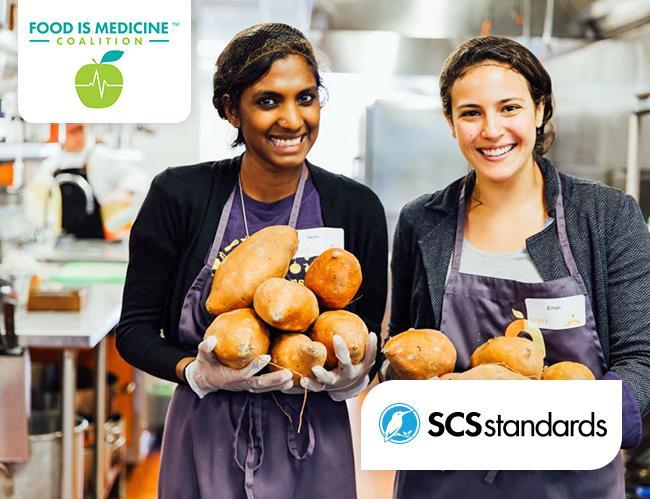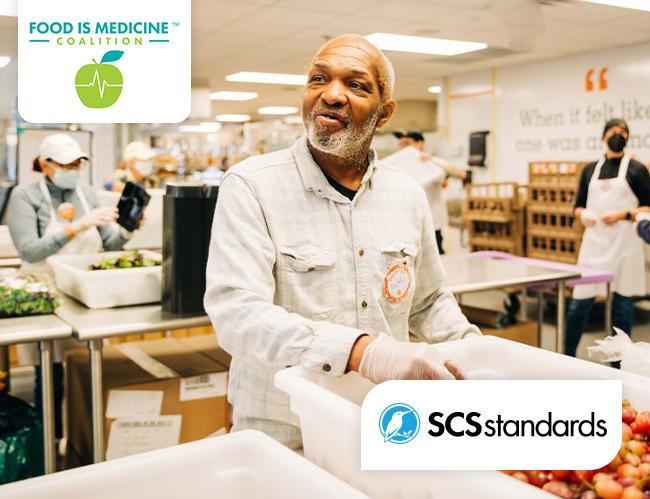Case Study - Standardizing an Ethic of Care: How the Food Is Medicine Coalition Established a Comprehensive, Industry Accreditation Program
The Food Is Medicine Coalition (FIMC) is a national collective of non-profit organizations across the United States that has provided medically tailored meal (MTM) and medically tailored grocery (MTG) services built on the power of food and community for almost 40 years. Grounded in the latest nutrition and medical science, FIMC agencies created the MTM intervention in response to the HIV/AIDS pandemic, recognizing the tailored nutrition needs of individuals experiencing chronic, severe, and life-threatening illness. Over nearly the past four decades, FIMC experienced unprecedented growth in the demand for MTM and a concurrent need for standardized best practices across the expanding MTM sector. As a coalition of leading MTM service providers in the nation, FIMC realized the urgency of defining their foundational intervention, which has been shown to improve client health outcomes and community resilience. With this in mind, FIMC set out to describe this life-saving service and, in the process, establish the standards necessary to spearhead a future of equity and quality for the MTM intervention.
The Challenge: The Need for Standardization in MTM
The concept of food is medicine has gained increasing attention over the past decade, based on compelling research conducted on the Coalition and by other scientists across the nation. This research, along with the unique challenges of the COVID-19 pandemic and an ongoing domestic focus on healthcare reform, led FIMC to search for a way to codify the power of MTMs as a clinical health intervention.
Identifying and measuring the specific yet diverse functions, customized services, and components of care offered through FIMC agencies presented opportunities and challenges. With agencies spread across the United States — each of which grew organically to meet the precise needs of their communities — FIMC’s approach to standardization had to span differences in cultures, geography, agency size, staff capacity, and access to resources.
Further, as mission-based, non-profit organizations, FIMC agencies were focused on qualifying and quantifying the wrap around services that community-based organizations offer, which go beyond meal delivery. To address these variables, FIMC focused its standard development efforts on formalizing best practices across the MTM landscape — not only to maintain the integrity of this essential work, but also to ensure that meeting client clinical health needs and ensuring community responsiveness remain the primary focus of the intervention.
Solutions Provided
FIMC needed to standardize and make auditable the best practices and science- based guidelines that have served as the foundation of its agencies’ work. The most challenging piece was the need to define and transform an ethic of care into specific and measurable requirements. FIMC turned to SCS Standards (SCS) to support its client- and community-centered approach and to facilitate a process to drive standards development and implementation.
SCS facilitated iterative conversations that built trust, underscored FIMC authority, and honored the heart and mission of this vital work. Through these constructive discussions, SCS drafted a formalized standard — the FIMC Medically Tailored Meal Intervention Accreditation Criteria and Requirements (ACR) — and worked with the Coalition team, offering expert insights and facilitation, until a polished standard was finalized. This process resulted in a first-of-its-kind accreditation program that documents and standardizes an effective approach to MTM provision. The accreditation program guides MTM providers to implement requirements that elevate this intervention in ways that prioritize equity and client needs.
Key Outcomes
- By providing the initial MTM framework, FIMC defined the baseline requirements all agencies must meet.
- The FIMC accreditation standard was established, focusing on the client experience and encompassing the full MTM intervention embedded in FIMC’s model.
- SCS’ process allowed FIMC to align, agree, and clarify methodologies, offering improved focus and strategies for adapting across agencies.
- Through the accreditation standard development process, member agencies strengthened relationships across diverse geographies and communities while centering client health and community needs.
- SCS facilitated deeper collaboration, including knowledge sharing sessions among agencies to determine the best possible practices to inform the standard requirements.
- SCS integrated FIMC’s core requirements, mission, and values to ensure all agencies operate consistently.
- SCS developed accompanying auditing protocols.
- After finalizing the accreditation standard, SCS trained FIMC staff to conduct accreditation audits and continues to support FIMC’s implementation of the accreditation program across FIMC membership.
“Throughout the process of developing the FIMC Medically Tailored Meal Intervention Accreditation Criteria and Requirements (ACR), SCS honored the work of individual, community-based organizations and placed them at the heart of the accreditation program we designed. The standard emphasizes client health and community needs and upholds our core values as a coalition. We simply could not have achieved these superlative outcomes without the expertise of the SCS Standards team.” – Alissa Wassung, Executive Director, Food is Medicine Coalition
“SCS’ expertise in standard writing and development far exceeded our expectations. The SCS team always guided our agencies and working groups to focus on the feasibility and auditability of our medically tailored meal provisioning requirements. We knew how important this process would be and engaged SCS for their expertise in demonstrating the value of quantifying and codifying our work. Our accreditation program is something we are remarkably proud of, and we have SCS to thank as a great partner.” – Karen Pearl, Chair, Food is Medicine Coalition and Special Advisor to the President & CEO, God’s Love We Deliver
Read and download this case study on the SCS Standards website here: Standardizing an Ethic of Care
For more information about Standards Development, please contact:
Victoria Norman
Executive Director, SCS Standards
For more information about FIMC Accreditation, please contact:
Food Is Medicine Coalition



